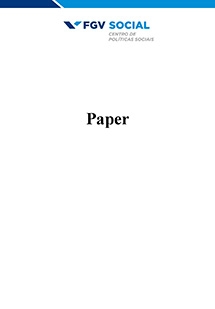
Poverty, Inequality and Income Policies: Lula's Real - Neri, Marcelo Cortes
Sobre o paper:
This study synthesizes the recent trends and cycles of poverty and inequality during the 1992 to 2004 period in Brazil, detailing some of its closest determinants with special emphasis on the role played by incomes policies. This is a condensed version of the work found in Neri (2007) http://www3.fgv.br/ibrecps/RET3/engl/index.htm. In the second section, we describe poverty long-run movements by monitoring the achievement of the first goal of the millennium development goal of reducing poverty as insufficiency of income. In section 3, we demonstrate the influences of electoral cycles over the income and the income transfers sponsored by the Brazilian state. In the following section, we present the main movement poverty across presidential mandates and city sizes, where we point out that the metropolitan crises was reversed in the last three years. Section 5 presents an analysis of unusual inequality fall in Brazil observed during the present decade. In Section 6, we design scenarios of per capita income growth and inequality in the future evolution of poverty. In sections 7, we calculate the minimum cost of eradicating poverty. In the three next sections, we discuss the role of income policies, tracing first a parallel between income policies aiming at the stabilization and equalization of social results, we describe the role of different income sources in this process and also look ahead in the normative sense to analyze the desired features of the main income policies in order to fight poverty in more efficient and equitable way. In section 10, we put Brasil social welfare in perspective through the lens of subjective evaluations of present and future happiness across countries. Finally, in the last section we present the main conclusions of this study where we point the differences found between average per capita growth estimates from PNAD and the National Accounts during the 2005-06 period.




